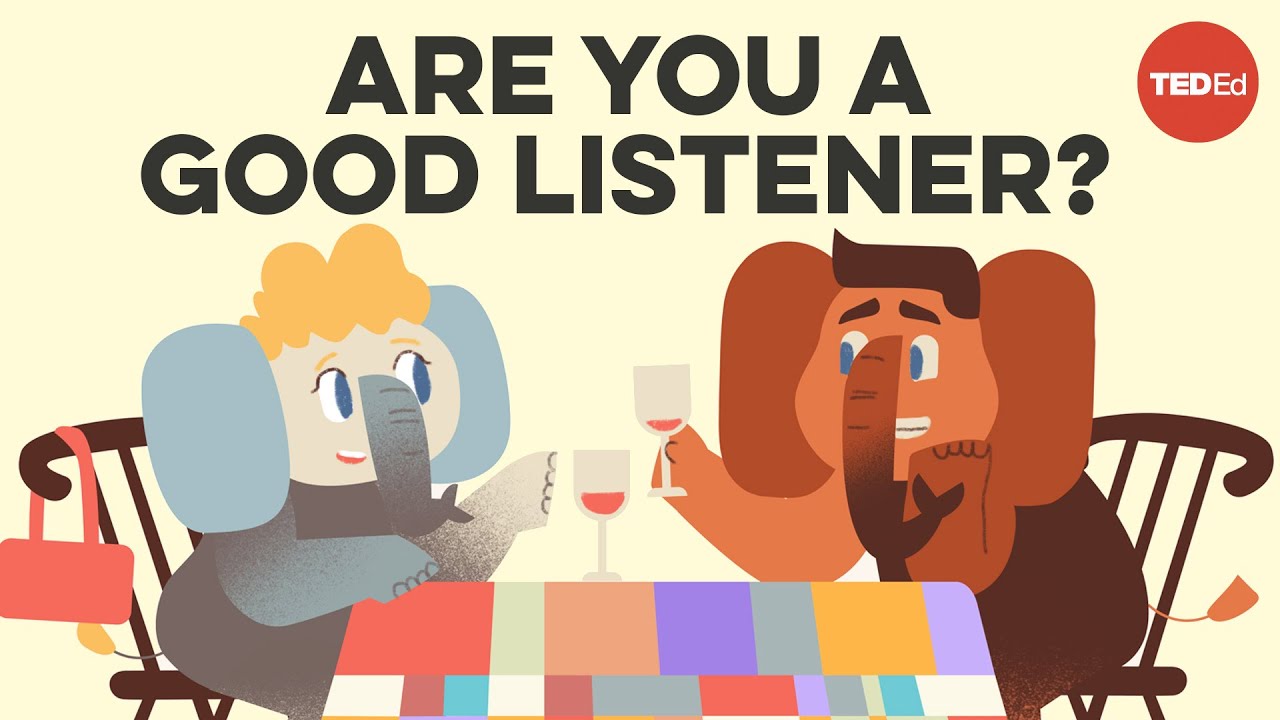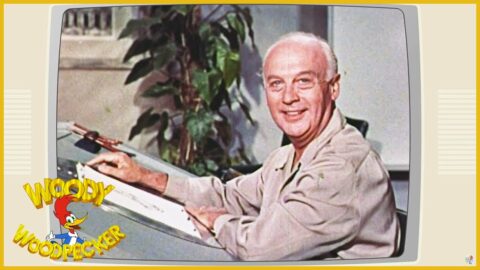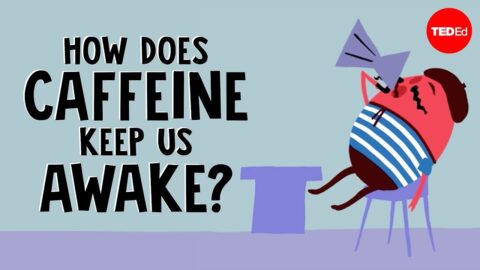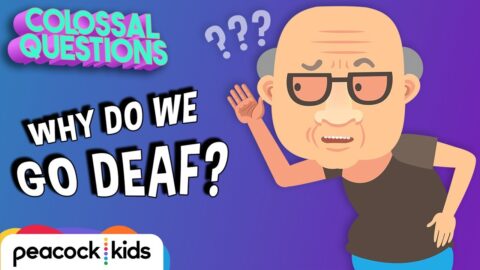It's easy to tell when someone's not paying attention,
É fácil perceber quando alguém não está prestando atenção,
but it can be surprisingly tricky to know what truly excellent listening looks like.
mas pode ser surpreendentemente complicado saber o que é uma audição verdadeiramente excelente.
Behavioral scientists have found that good listening
Cientistas comportamentais descobriram que uma boa escuta
is one of the most important things we can do to improve our relationships,
é uma das coisas mais importantes que podemos fazer para melhorar nossos relacionamentos,
develop our worldview, and potentially even change people's minds.
desenvolver nossa visão de mundo e, potencialmente, até mesmo mudar a mente das pessoas.
So, what can we do to become better listeners?
Então, o que podemos fazer para nos tornarmos melhores ouvintes?
At its core, listening in a one-on... one conversation is about taking an interest
No fundo, ouvir numa conversa individual é sobre se interessar
in another person and making them feel understood.
em outra pessoa e fazê-la se sentir compreendida.
There's no universally agreed upon definition of high-quality listening,
Não existe uma definição universalmente aceita de audição de alta qualidade,
but some recurring features include attentiveness, conveying understanding,
mas algumas características recorrentes incluem atenção, transmissão de compreensão,
and showing a positive intention towards the speaker.
e demonstrando uma intenção positiva em relação ao orador.
This doesn't mean you can simply go through the motions
Isso não significa que você pode simplesmente seguir em frente
researchers have found that merely smiling and nodding
pesquisadores descobriram que apenas sorrir e acenar
at set intervals doesn't quite work.
em intervalos definidos não funciona muito bem.
However, there is something slightly performative about listening
No entanto, há algo ligeiramente performático em ouvir
in that it's important to show you're doing it.
pois é importante mostrar que você está fazendo isso.
So, in addition to actively attending to a speaker's words,
Então, além de prestar atenção ativa às palavras do orador,
good listeners also use questions and body language
bons ouvintes também usam perguntas e linguagem corporal
that indicate their understanding and their desire to understand.
que indicam sua compreensão e seu desejo de entender.
This might feel awkward at first,
Isso pode parecer estranho no começo,
and what's most effective might depend on your relationship with the speaker.
e o que é mais eficaz pode depender do seu relacionamento com o orador.
But with time and practice you can internalize these basic behaviors.
Mas com tempo e prática, você pode internalizar esses comportamentos básicos.
So let's say a good friend wants to tell you about an issue
Então digamos que um bom amigo quer lhe contar sobre um problema
they're having with their partner.
que estão tendo com o parceiro.
Before even starting your conversation,
Antes mesmo de começar a conversa,
remove any distractions in the environment.
remova quaisquer distrações do ambiente.
Turn off the TV, take off your headphones and put your phone away— far away.
Desligue a TV, tire os fones de ouvido e guarde o telefone — bem longe.
One study showed that even the visible presence of a phone
Um estudo mostrou que até mesmo a presença visível de um telefone
made conversations feel less intimate and fulfilling to those involved.
fez com que as conversas parecessem menos íntimas e gratificantes para os envolvidos.
Once the conversation begins,
Uma vez que a conversa começa,
one of the most important things you can do is also the most obvious
uma das coisas mais importantes que você pode fazer é também a mais óbvia
try not to interrupt.
tente não interromper.
This doesn't mean you need to stay completely silent.
Isso não significa que você precisa ficar completamente em silêncio.
But if you do interject, look for natural pauses
Mas se você interromper, procure por pausas naturais
to ask open-ended questions that benefit the speaker,
fazer perguntas abertas que beneficiem o orador,
not just your curiosity.
não apenas sua curiosidade.
Questions like “What happened next?” or “How did that make you feel?
Perguntas como “O que aconteceu depois?” ou “Como isso fez você se sentir?
confirm that you're following the story while also helping the speaker
confirme que você está acompanhando a história e também ajudando o orador
dive deeper into their own thoughts.
mergulhar mais fundo em seus próprios pensamentos.
Another great way to show your understanding is by summarizing
Outra ótima maneira de mostrar sua compreensão é resumindo
what you just heard and asking if you've missed anything.
o que você acabou de ouvir e perguntando se você esqueceu de alguma coisa.
Summaries like this show the speaker that you're truly trying to understand them
Resumos como este mostram ao orador que você está realmente tentando entendê-lo
rather than just waiting for your turn to talk.
em vez de apenas esperar sua vez de falar.
Speaking of which, while a good conversation requires back and forth,
Falando nisso, embora uma boa conversa exija idas e vindas,
planning out your response while the speaker is talking
planejando sua resposta enquanto o orador fala
is a common way to miss what's being said.
é uma maneira comum de não entender o que está sendo dito.
So try to stay present and if you lose focus,
Então tente permanecer presente e se você perder o foco,
don't be shy about asking the speaker to repeat what you missed.
Não tenha vergonha de pedir ao orador para repetir o que você perdeu.
This might feel embarrassing,
Isso pode ser embaraçoso,
but asking for clarification actually shows that you're committed
mas pedir esclarecimentos na verdade mostra que você está comprometido
to understanding.
para a compreensão.
Finally, don't be afraid of silence.
Por fim, não tenha medo do silêncio.
It's okay to ask for a moment to formulate your response
Não há problema em pedir um momento para formular sua resposta
and taking a beat to think can help speakers reflect on their speech as well.
e parar para pensar pode ajudar os oradores a refletirem sobre seu discurso também.
These might seem like small changes, but together they make a big difference.
Essas mudanças podem parecer pequenas, mas juntas fazem uma grande diferença.
And when people feel heard, they report more satisfaction,
E quando as pessoas se sentem ouvidas, elas relatam mais satisfação,
trust, and connection in their relationships.
confiança e conexão em seus relacionamentos.
In the workplace, employees who feel heard generally experience less burnout,
No local de trabalho, os funcionários que se sentem ouvidos geralmente sofrem menos esgotamento,
and perceive the managers who listened to them more favorably.
e perceber os gestores que os ouviram de forma mais favorável.
Unfortunately, while it might be easy to listen to some people,
Infelizmente, embora seja fácil ouvir algumas pessoas,
it can be hard to muster all this focus and attention
pode ser difícil reunir todo esse foco e atenção
if you disagree with or dislike the speaker.
se você discorda ou não gosta do orador.
But these situations might actually benefit most from your efforts
Mas essas situações podem realmente se beneficiar mais com seus esforços
to listen openly.
ouvir abertamente.
The theory of psychological reactance suggests that trying to force someone
A teoria da reatância psicológica sugere que tentar forçar alguém
to change their mind makes them more likely to defend their point of view.
mudar de ideia os torna mais propensos a defender seu ponto de vista.
However, recent studies suggest that high-quality listening fosters
No entanto, estudos recentes sugerem que uma audição de alta qualidade promove
open-mindedness by creating a non-judgmental
mente aberta, criando uma atitude sem julgamentos
and psychologically safe environment.
e ambiente psicologicamente seguro.
Of course, truly open-minded listening isn't about changing people's minds.
É claro que ouvir com a mente verdadeiramente aberta não significa mudar a opinião das pessoas.
Good listening is not the same as agreeing,
Ouvir bem não é o mesmo que concordar,
and conversations don't have to end with a happy resolution.
e as conversas não precisam terminar com uma resolução feliz.
But even during a disagreement,
Mas mesmo durante um desentendimento,
sometimes being heard is enough to start a deeper conversation.
às vezes ser ouvido é o suficiente para iniciar uma conversa mais profunda.
Legenda Anterior
Pronunciar Palavra
Traduzir Frase Atual
Pausar / Play
Aumentar Fonte Legenda
Próxima Legenda
Pronunciar Frase
Dois Cliques para Salvar Palavra
Desativar Legenda / Ativar Legenda
Diminuir Fonte Legenda













